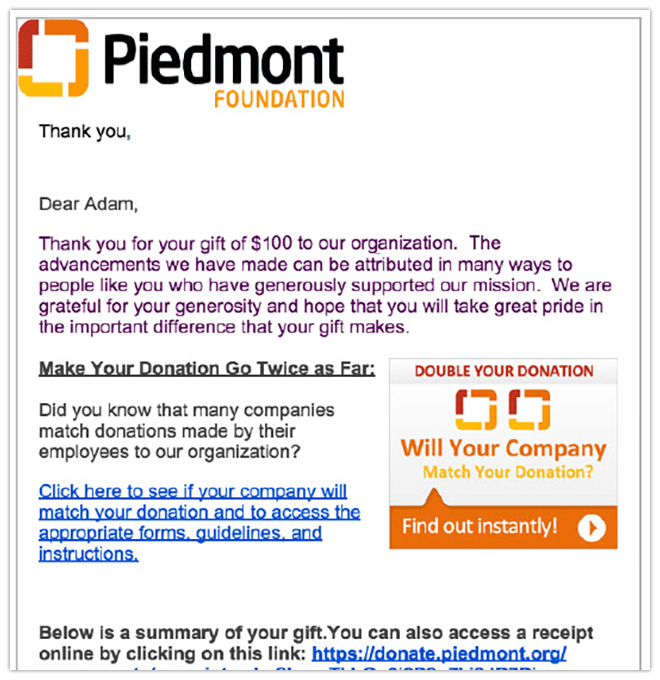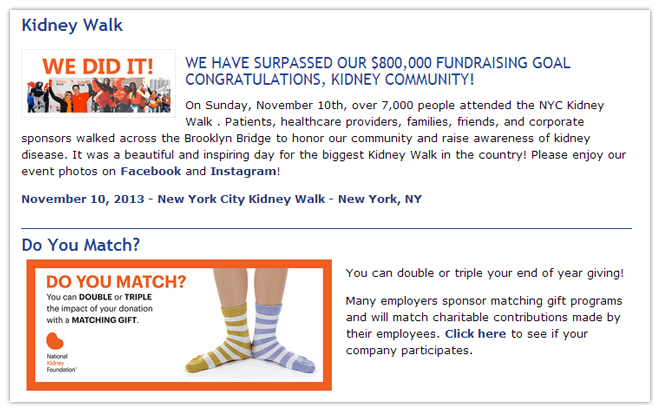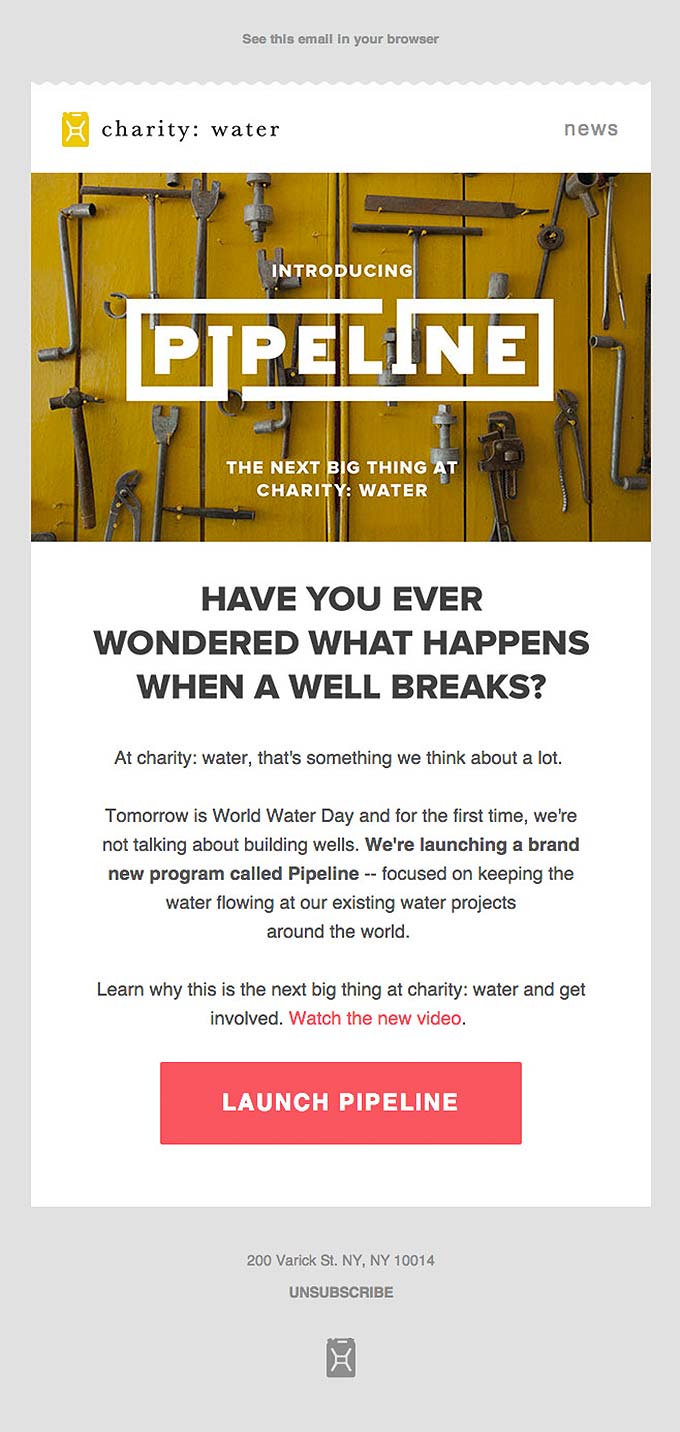Article first published January 2018, updated September 2019
Nonprofits are always looking for ways to increase their fundraising revenue without burning out their incredible supporters. Matching gifts are the perfect way to do that.
Do your donors work for companies that offer matching gifts as part of their corporate giving programs? If so, they can submit proof of their donations to their employer, and their employer will then donate the same amount to your nonprofit.
But, in order to increase the success of matching gifts, you have to make sure your subscribers know about the opportunity. You’re likely already paying special attention to how you ask for donations via email. But what if you could make just a few changes to your email strategy and see an increase in donations?
Read on to discover how to encourage matching gifts in five types of emails that you’re likely already sending to subscribers.

1. Automated donation confirmation emails
Your donors are always at the height of the giving mood during the donation process. They’re excited about your cause and clearly committed to supporting it. Take advantage of this mindset with strategic automated email messages that promote matching gifts.
Online fundraising platforms allow nonprofits to automatically send confirmation emails to those who fill out an online donation form.
So what do you do with these emails that arrive on the tail end of charitable giving?
You ask your donors to take a small extra step to take their donation further with matching gifts. Here’s how:
- Include a matching gift plugin. By placing a plugin that lets your donors search for their company’s corporate philanthropy program within the email itself, you make it easier for your donors to follow through with a matching gift request.
- Write clear, short directions. Many donors who don’t submit matching gift requests only miss out because they don’t know a lot about the process. If you write instructions that make the process sound as simple and easy as it is, you make it less intimidating.
- Include helpful images. For people skimming their emails, images can capture their attention more than even the most engaging text. If you can turn matching gift information into a graphic, it might encourage your readers to engage with it.
Take a look at how the Piedmont Foundation incorporates these elements in their donation confirmation email:

If you want to make the most of this strategy, be sure your online giving provider allows you to configure these transactional emails to the level of customization you need. You might not be able to include an HTML plugin with your provider.

2. Thank yous for campaign contributions
The completion of a large campaign is an important moment for donors, so it’s a good time to get in touch with them.
After your donors have worked together to reach a fundraising goal, they’re excited about their collective accomplishment and reinvigorated in their passion for your mission.
Hopefully, you’ve already built donor stewardship into your capital campaigns (and, if you haven’t, check out MobileCause’s guide to capital campaigns for tips). That stewardship strategy likely includes a Thank You message of some kind, either an invitation to a celebratory event or a simple handwritten or digital letter.
However you send it, your Thank You letter should remind your donors to submit their matching gift paperwork to their employers. There are a few things you should tell your donors to watch out for when sending a Thank You letter that reminds them to submit matching gift paperwork:
- Deadlines: Most corporate giving programs come with deadlines for submitting matching gift requests. Most are based on the time of donation (e.g., no later than 90 days after the donation), though some are based around set dates (e.g., no later than the last pay period before tax day).
- Paperwork: Chances are you don’t know exactly what paperwork your donors need to fill out. But what you can do is refer them to a matching gift database that provides that information or the HR department at their company.
- Requirements: All corporate giving programs are different, especially when it comes to the gifts that are eligible for matching. Many companies set minimum and maximum amounts that they’ll match, and at what ratio.
When you’re sending matching gift solicitations along with your campaign Thank Yous, be sure to keep your focus on the celebration. Your donors shouldn’t see you just taking another chance to get something more out of them.
Instead, frame your matching gift request as a way to make their hard work go even further without anyone reaching back into their pockets.
Need a great example? Take a look at how the National Kidney Foundation framed their matching gift request after their campaign came to an end:


3. Automatic annual fundraising reminders
We know that the end of the year is one of the most profitable for nonprofits, with about 30% of all donations coming in during December, and 12% in the last three days of the month.
That trend makes sense: the charitable spirit of the holidays combined with tax benefits of donating before the first day of the new year. And it’s no secret, which means that you won’t be the only one ramping up your email marketing in the fourth quarter.
So how can you make your message stand out by combining this predictable increase in charitable giving with smart matching gift solicitations?
The best strategy to make sure your matching gift asks don’t get lost in the pile is two-pronged. First, you have to make sure your donors open your emails by writing a great subject line for a year-end proposal that includes one or more of the following:
- A sense of urgency
- An introduced information gap
- An exclusive preview
- A review of past highlights
- A look forward to the new year
Once your donors have opened your email, you need to ensure that yours is the nonprofit they decide to donate to. Matching gifts give you the edge.
If your supporters can donate the same amount of money to two organizations but one of them will help them take their donation to the next level, they’ll go with the latter. Your solicitations will stand out by showing your donors how much you care about making their gifts go further, without asking them for any more of their own money.

4. Invitations to fundraising events
Event invitations are like candy to donors—they’re emails that they enjoy receiving and are likely to read all the way through.
Invitations for fun fundraising events make your donors feel special, so they’re already excited when they open your email. And, after your event, your attendees will be looking for updates in their inboxes.
As such, fundraising event emails are a great way to get your supporters out to your event and then follow up with them afterward. But, more than that, they’re a great way to promote matching gifts, like this:
- Ask attendees to match their advance donations to prepare for the event.
- Encourage attendees to look up their employer’s corporate giving program before attending your event.
- Follow up after an event to encourage donors to match the donations they made at your event.
The donors who are excited about your fundraising event want you to succeed, and they’d donate more, if they could. So why not show them how they can donate more by spending just a little time filling out forms?
And, if you need some matching gift-friendly fundraising event ideas, check out this rundown of exciting fundraising event ideas from BidPal.

5. Requests to update donor information
Keeping up with your donor database is a year-round effort. It’s important to make sure that you have the right contact information, payment preferences, personal details, and giving history on record, or you won’t be able to effectively engage your donors.
Recording employment information and giving history helps you narrow down which donors would be best to send matching gifts information to. But, beyond that, you can actually incorporate matching gifts into your updating process.
When you do your next routine spring cleaning of your donor database, send out an email to all of your donors to ask them to update their profile. Here are some ways to make sure you collect the information you need with this email:
- Subject line: Your donors should know what you’re asking for before they even open the email. Consider including questions or requests in your subject line, such as: “Do we have your employer information on file?” or “Keep us updated with your employer information.”
- Reply format: Are you asking your donors to send you a reply email with their information? That can take a long time for you to dig through later. Instead, make things as easy as possible for your team by setting up a survey form that’ll collect answers and sort them for you.
- Explanation: Your donors are more likely to take the time to provide you information if you explain why they should. Share a story of a donor whose employer matched their gift or a corporate sponsor who made a fundraising event possible.
Promote your update across your website and social media to make sure that your donors know to look out for your email.
This email is a great place to include a matching gift solicitation because your donors will be thinking about their past involvement with your organization, as well as their employers’ corporate giving programs.
Other ways to promote your matching gift program
While the 5 ways to increase the impact of your matching gift challenge are some of the most impactful, they are, by far, not the only ones. One thing you need to remember about nonprofit email marketing is the fact that all you need to succeed is to be creative. Here are 3 other creative emails you can send to boost revenue from matching gifts.
1. Holiday emails
Holidays are an important part of nonprofit organizations’ calendars. That’s because most charitable giving happens during the holidays. It’s easier to give when you are in a cheerful mood, and it’s for this very reason that, as a nonprofit marketer, you need to leverage the holiday season to help boost revenue from your matching gift program.
Source: Really Good Emails
A good example of a well-executed email meant to boost revenue from a matching gift program is the above email from Me-to-We. Sent just after Thanksgiving, this email encourages donors to give, so that those who can’t afford a decent meal can be equipped to put food on the table. Due to its psychological effect, this email succeeds in achieving its goal: boosting revenue.
2. Awareness emails
Another great way to boost revenue from your matching gift program is to send an awareness email. An awareness email serves the purpose of painting a picture of the need you’re trying to meet or the problem you’re trying to solve. Never assume that every donor knows exactly what’s happening on the ground; a good number may not know. A great example of an awareness email is the one below from Charity water:
Source: Really Good Emails
Because it can take a lot of space to share everything, Charity Water decided to introduce their new program and then pointed their readers to a video that fully explains the cause. Once people understand your vision, mission, and the plight of the people you’re helping, it becomes easier for them to participate in your matching gift challenge. Never underestimate what increasing awareness can do for your fundraising campaigns.
3. Reminder emails
As the name suggests, a reminder email serves the purpose of reminding donors to participate in your matching gift program. To pull this off, you’ll need to create a segment of donors who’ve received your initial emails but haven’t participated yet.
Remind them of:
- The importance of the cause
- The impact their donation will make
- The fact that their donation will be doubled by the matching gift program
Sometimes all people need to participate is a gentle reminder, so don’t give up on those donors who haven’t taken part in your matching gift campaign. Simply send them a reminder and watch the donations roll in.
Wrap up
Whether it’s the end of the year or any other Tuesday, there’s an opportunity to include information encouraging your donors to submit matching gifts requests to their employers.
By incorporating these techniques into your email strategy, you should see an increase in interest in corporate giving. For more tips on how to improve your fundraising campaigns check out our nonprofit marketing guide.







